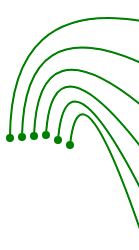The current situation in the care sector, especially for dementia patients, urgently requires sustainable support for patients and carers (relatives, nursing staff, etc.), especially in communication and dealing with patients. At present, it is in no way possible for carers to take care of dementia patients with a reasonable amount of time in such a way that dementia patients (mainly Alzheimer's disease) can spend their everyday lives in a dignified manner.
Since it is not possible, especially in nursing homes, to achieve round-the-clock care of patients by nursing staff, the concept of an intelligent, emotional-empathetic digital assistant (IEEDA) was developed, which accompanies patients through the day in various communicative ways. The IEEDA should in particular
- to be able to communicate in an intelligent way with the patient, nurses, doctors and relatives, but also with other patients.
- It should communicate in a more sensitive way, adapted to the patient's situation.
- For this, he needs the possibility of recognizing emotions, especially through speech, also through gestures and writing and, if necessary, through the recognition of facial expressions, especially the changes in the pupils.
- On the basis of the emotion analysis, a further program module ("Empathy") is to use these data in order to be able to follow a suitable communication path according to the current emotional state of the patient (cheerfulness, sadness, apathy, need for communication/talkativeness etc.).
- The "IEEDA", in the following called "ALOIS", is supposed to learn the form of communication individually suitable for each patient and the language peculiar to him, whereby it is assumed that the verbal expressiveness of the Alzheimer patients changes and becomes increasingly restricted in the course of the development of the disease.
- Under these conditions, it is possible to build a communicative bridge between the above-mentioned groups (nursing staff, relatives, caregivers, etc.) and the patient by using the full range of digital technology, especially for the purpose of communication.
- so that IEEDA ALOIS can be a real assistant to the patient, learning his needs in his language form, responding to them in different ways, listening to his stories, also animating him to tell, remember, conveyed through music and images still stuck in the patient's memory and connected to each other. At the same time, ALOIS, e.g. embedded in an AAL environment (see "Ambient Assisted Living" at German Wikipedia), should have the possibility to monitor dementia patients, to remind them to take medication (especially important, e.g. when it is necessary to take it at the right time) and to integrate it into the existing network of AAL communication possibilities, or to expand this network by own options (e.g. memory clubs in the in-house network).
- In particular, ALOIS should serve the patient in an intelligent way as MFC ("Mental Fitness Coach") in memory training, in order to help the patient in a creative way to initiate activities against memory loss, which slow down the cognitive degradation, by the continuous occupation of the patient.
The manifold possibilities of interaction of intelligent, digital assistants in the daily routine of patients will be described in detail at a later date due to the COVID-19 crisis. We want to use the first feedback from our preliminary study on the suitability of IEEDAs for everyday use by patients and caregivers.


 English
English  Deutsch
Deutsch